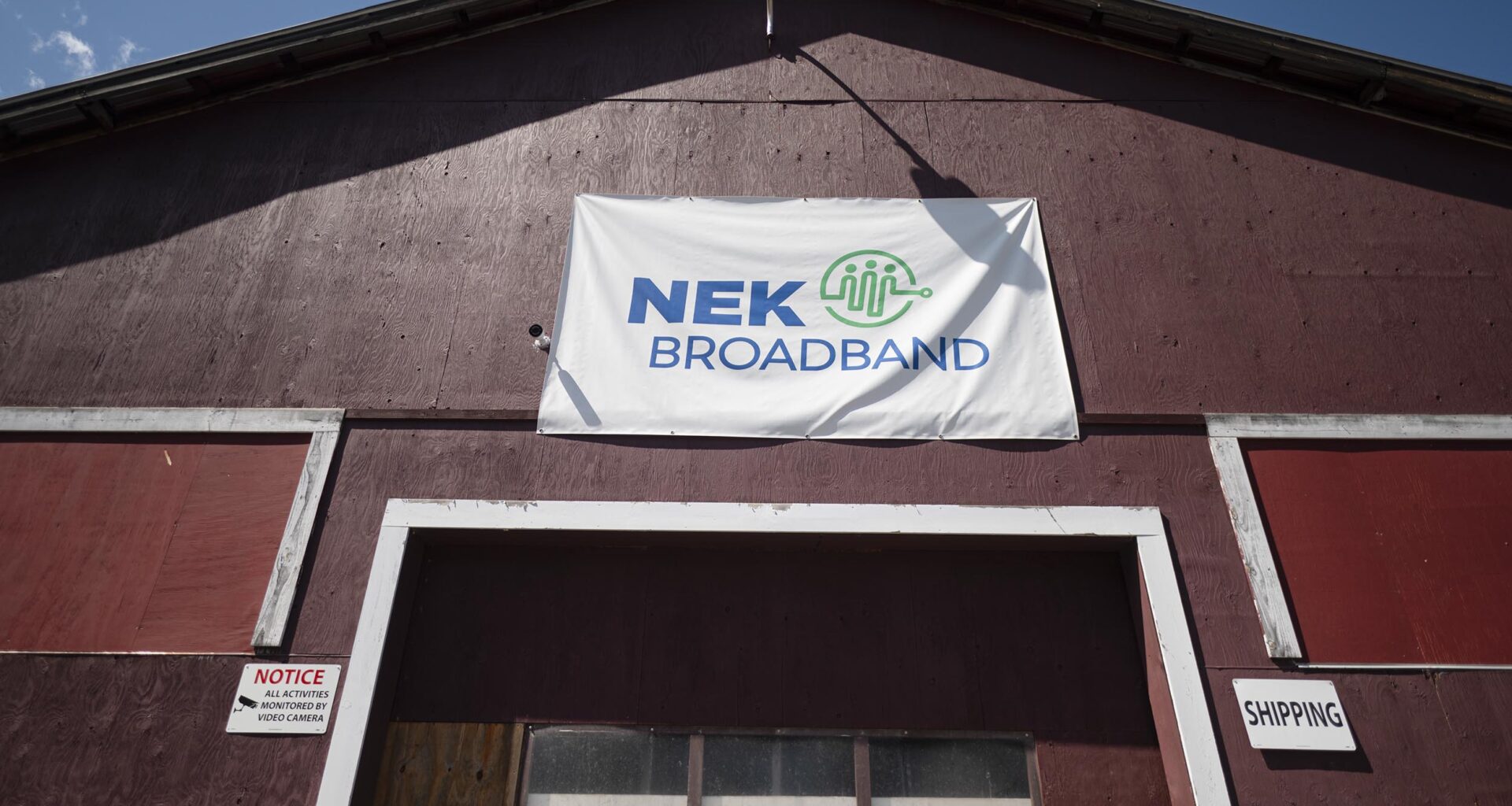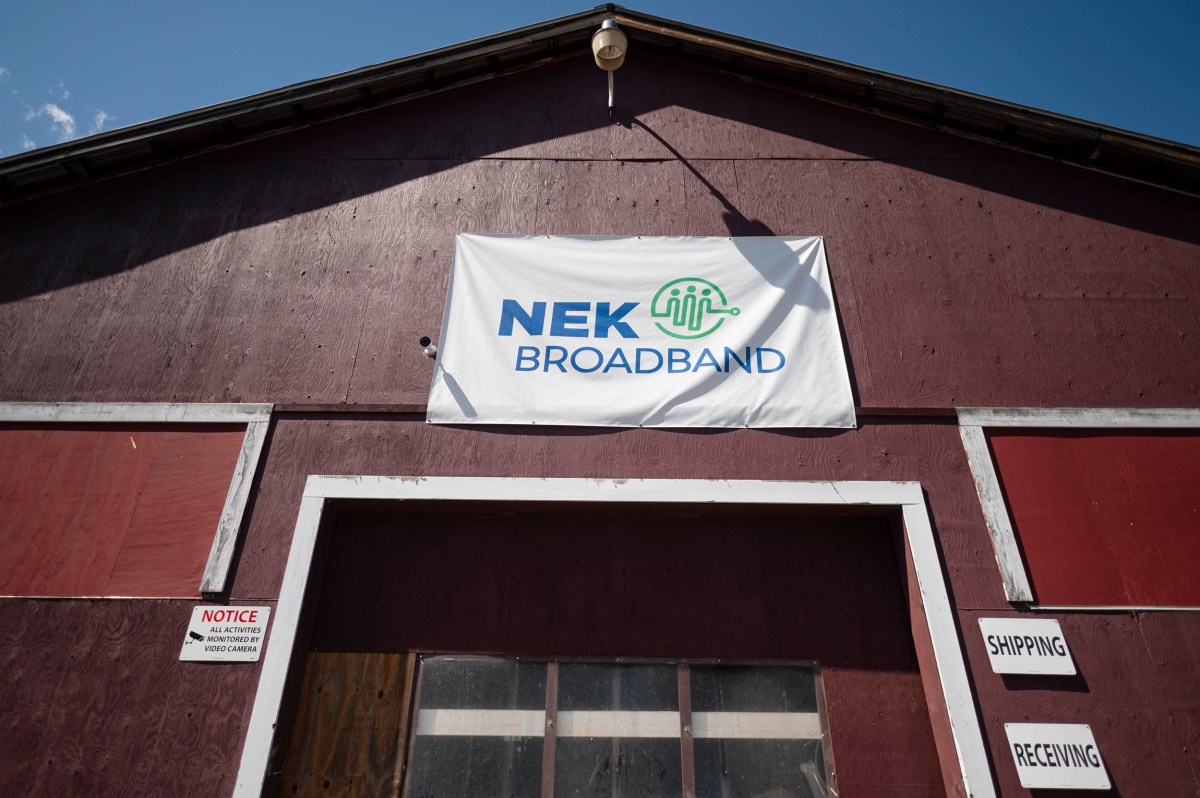 The NEK Broadband offices and warehouse in Danville on Wednesday, Sept. 3. Photo by Glenn Russell/VTDigger
The NEK Broadband offices and warehouse in Danville on Wednesday, Sept. 3. Photo by Glenn Russell/VTDigger
Vermont is moving closer to universal broadband internet access, officials say, as the state’s Community Broadband Board released a proposal last week to allocate nearly $180 million in federal, state and private funds for broadband infrastructure projects.
The bulk of the funds have been made available to Vermont through the federal Broadband Equity, Access and Deployment, or BEAD, program. If the proposal is accepted by the federal government, rates of access to broadband internet will rise to 99% statewide through these grants, according to Community Broadband Board Executive Director Christine Hallquist.
The board, which was formed in 2021 to advance broadband access in the state, has faced a number of challenges in crafting the proposal, including bureaucratic delays and the high inherent costs of rural broadband construction. But local leaders say the infrastructure this funding will provide — if approved by the federal government — will have far-reaching benefits for rural communities across the state, and particularly in the Northeast Kingdom.
The timeline for greenlighting BEAD funding has been complicated.
The National Telecommunications and Information Administration under President Donald Trump changed its requirements for state proposals in June, giving states just 90 days to submit revised materials. Vermont’s broadband board made its proposal available for public comment starting last week, and the federal deadline for submission is Thursday.
The board’s plan seeks to use about $119 million in federal BEAD funding to deploy infrastructure — just over half what the state was originally allocated by the program in 2023. There has been no guidance from the Trump administration about how or if the state will be allowed to use the remaining funds.
A spokesperson for the Vermont Community Broadband Board said the state will also submit a proposal for related non-infrastructure projects to the same funding source Thursday, but that its contents remained confidential until then.
Among the telecommunications administration’s June rule changes was new language about how states should weigh different technologies, including a reclassification of low Earth orbit satellite internet as a potentially equivalent alternative to fiber optic.
In the wake of that policy change, Elon Musk’s company SpaceX applied for its Starlink service to be the provider for essentially every Vermont address that the federal grants were intended to cover, according to Hallquist.
But Hallquist said the technology simply doesn’t work very well for many places in Vermont when you account for factors like foliage cover and the state’s irregular, mountainous landscape.
“We did an extensive engineering analysis,” Hallquist said, to which SpaceX “didn’t even respond properly.”
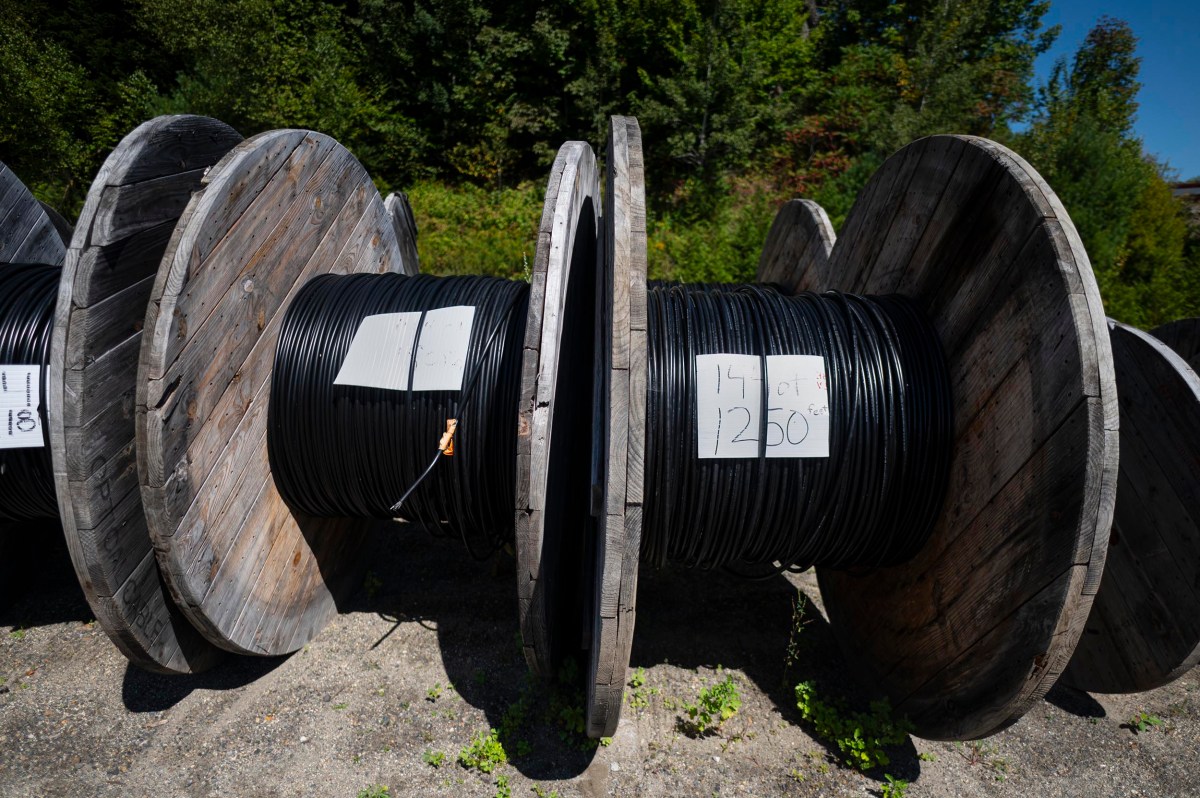 Spools of fiber optic cable seen at the NEK Broadband offices and warehouse in Danville on Wednesday, Sept. 3. Photo by Glenn Russell/VTDigger
Spools of fiber optic cable seen at the NEK Broadband offices and warehouse in Danville on Wednesday, Sept. 3. Photo by Glenn Russell/VTDigger
“We defined them as a non-priority technology,” Hallquist said of providers like SpaceX. The state will use low Earth orbit satellites only where the cost for ground technology exceeds $17,000 for a single location.
Fiber-optic internet is the clear focus of the board’s proposal, accounting for roughly 90% of the nearly 15,000 BEAD locations covered by the grant. Satellites will cover less than 7% of locations.
SpaceX did not respond to requests for comment.
The new rules also placed a greater emphasis on finding lowest-cost solutions for broadband services, and eliminating what the new administration views as unnecessary regulatory measures surrounding issues like climate awareness and equitable hiring practices.
In an ideal world, Hallquist said, broadband internet would be guaranteed to all residents, regardless of price, but that she saw the logic of cost-cutting by transferring a small number of marginal, expensive sites in rural areas to satellite coverage. In talks with providers, the board was also able to reach lower cost agreements this summer than in previous negotiations.
Environmental impact and fair employment are not significant worries, according to Hallquist. Providers will still have to meet statutory environmental requirements, and Vermont employers meet high fair-practice requirements anyway, she said.
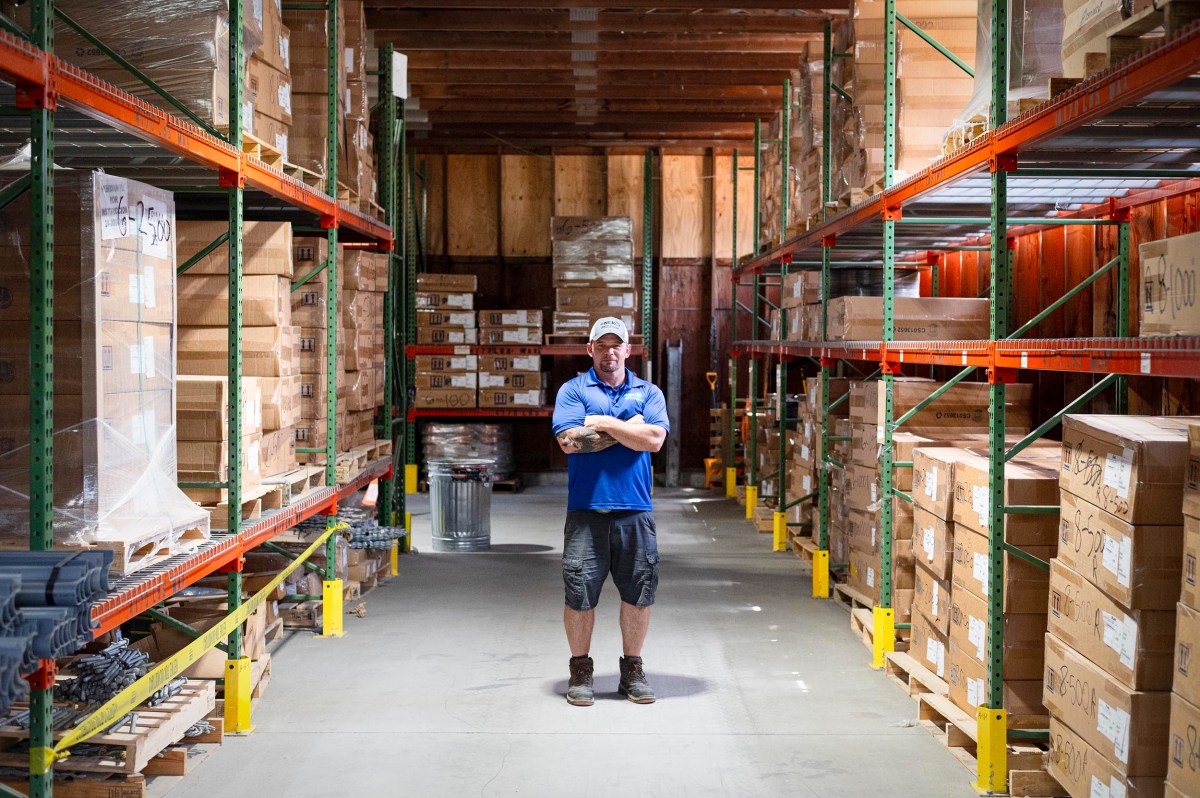 Jason Stebbins, logistics manager for NEK Broadband and CVFiber in the company’s Danville warehouse on Wednesday, Sept. 3. Photo by Glenn Russell/VTDigger
Jason Stebbins, logistics manager for NEK Broadband and CVFiber in the company’s Danville warehouse on Wednesday, Sept. 3. Photo by Glenn Russell/VTDigger
‘A once-in-a-generation investment’
The Community Broadband Board has made NEK Community Broadband the largest provisional grant recipient in the proposal by far, with an allocation of over $93 million. The Northeast Kingdom provider, which is run as a communications union district (a municipal body formed to advance local internet infrastructure), serves 72 towns in the region.
Christa Shute, executive director of NEK Broadband, said her organization’s service area includes more than half of the state’s eligible households underserved by internet. The funding would help build over a thousand miles of fiber optic infrastructure, reaching nearly 10,000 addresses, she said.
Shute’s optimism is cautious — she’s aware the proposal still needs to be accepted at the federal level.
Hallquist said the board was confident enough in the proposal getting federal approval that it would be appropriate for some providers to begin construction at their own risk. Shute intends to stop short of that, but said her team will begin the permitting and design work that must come before construction begins.
“It’s a once-in-a-generation investment that’s going to shape our communities for decades,” Shute said. “It will put individuals (in the NEK) on an equal playing ground for the opportunity to join the rest of the world.”
Heather Alger, the head of economic access programs at Northeast Kingdom Community Action, said she views internet access as a necessity for full participation in society. It’s necessary not just for social connectedness, but for health care, civic engagement and social services.
“Individuals here are left behind because they don’t have access,” Alger said. “We need to get infrastructure into the Northeast Kingdom.”
NEK Broadband offers reduced rates and free installation for qualifying low-income customers, which Alger has seen make a “tremendous impact” for her clients.
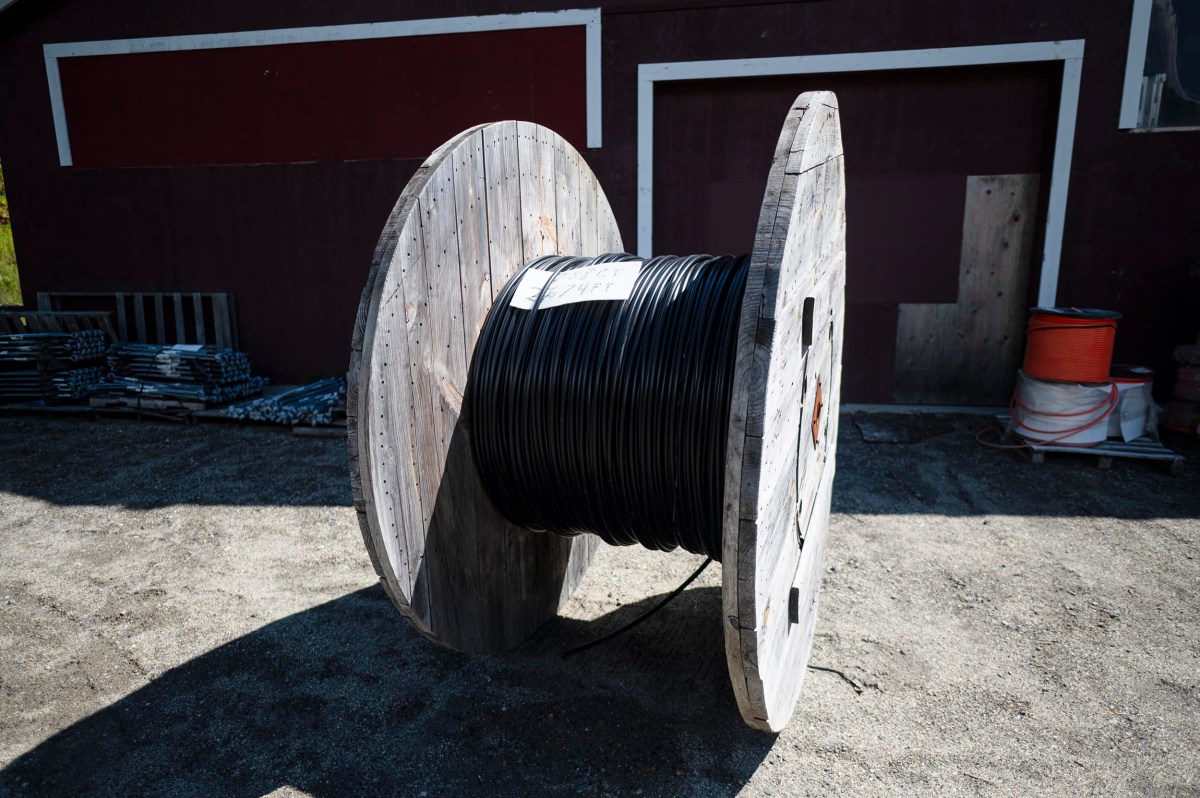 A spool of fiber optic cable seen at the NEK Broadband offices and warehouse in Danville on Wednesday, Sept. 3. Photo by Glenn Russell/VTDigger
A spool of fiber optic cable seen at the NEK Broadband offices and warehouse in Danville on Wednesday, Sept. 3. Photo by Glenn Russell/VTDigger
Ellie de Villiers, president of the Vermont Communications Union District Association and executive director of Maple Broadband, another provisional BEAD recipient, said she was glad the majority of the contracts had gone to district companies laying terrestrial technology.
The cost-driven language of the new telecommunications administration rules had made de Villiers worried that smaller or publicly owned companies wouldn’t be able to compete with larger for-profit corporations, she said. De Villiers called the level of resourcing that will potentially be gained by Vermont communications union districts “very good news.”
Several private companies have also been provisionally allocated grants, including Consolidated Communications and Comcast.
“We recognize how important it is for Vermonters to have access to affordable, reliable broadband … we have a strong track record of working closely with Vermont’s Communications Union Districts (CUDs) to deliver future-ready fiber to unserved and underserved communities,” wrote a spokesperson for Consolidated Communications in a statement to VTDigger on Wednesday. “Our goal is to expand choice, not limit it.”
Shute also emphasized the possible cultural impacts of the investment.
“We all talk about health and we talk about business,” she said, “but just being able to connect with people is also really important.”

